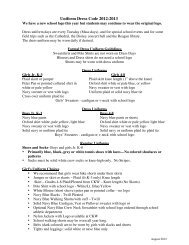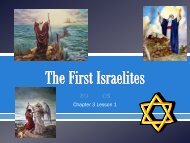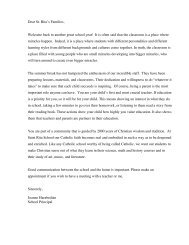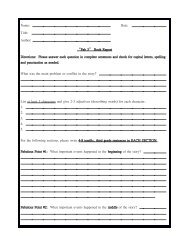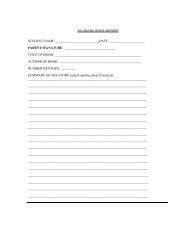You also want an ePaper? Increase the reach of your titles
YUMPU automatically turns print PDFs into web optimized ePapers that Google loves.
<strong>Ch</strong>apter 8 <strong>Sec</strong>tion 3
• Key Terms:<br />
• Legacy<br />
• What a person leaves<br />
behind when he or she dies<br />
• Hellenistic Era<br />
• Period when <strong>the</strong> Greek<br />
language and Greek ideas<br />
spread to <strong>the</strong> non-Greek<br />
peoples of southwest Asia<br />
• Key People:<br />
• Philip II<br />
• <strong>Alexander</strong> <strong>the</strong> <strong>Great</strong><br />
• Key Places:<br />
• Macedonia<br />
• <strong>Ch</strong>aeronea<br />
• Syria<br />
• Alexandria
• Macedonians<br />
• Raised sheep and horses<br />
• Grew crops in river valleys<br />
• Warrior people: fought on horseback<br />
• 400 B.C., became a powerful kingdom
• 359 B.C., became king of Macedonia<br />
• Lived in Greece as a young man<br />
• Admired Greeks<br />
• Art<br />
• Ideas<br />
• Armies<br />
• Wanted a kingdom strong enough to defeat Persian Empire<br />
• Needed to unite Greek city-states and Macedonia
• Military Methods:<br />
• Established a professional<br />
army<br />
• Full-time<br />
• Well-paid<br />
• Highly skilled<br />
• New battle formations<br />
• Improved Phalanx<br />
• New Weapons<br />
• Catapults<br />
• Wheeled battering rams
• Using his military, he took over city-states:<br />
• Force<br />
• Bribed to surrender<br />
• Some united voluntarily<br />
• Demos<strong>the</strong>nes: A<strong>the</strong>nian lawyer<br />
• Warned A<strong>the</strong>nians about Philip<br />
• Peloponnesian War had left Greeks weak and divided<br />
• Many young Greeks joined Persian army<br />
• 338 B.C., Macedonians defeat Greeks at Battle of <strong>Ch</strong>aeronea<br />
• Philip controls most of Greece
• Ga<strong>the</strong>r with your 2 nd Base Partner<br />
• Turn to Page 399<br />
• Read “Demons<strong>the</strong>nes’ Warning”<br />
• Answer <strong>the</strong> Document-Based Question (DBQ)<br />
• Which line of Demos<strong>the</strong>nes’ speech tells what he thinks will happen if<br />
<strong>the</strong> Greeks ignore Philip?<br />
• “ . . . unless we are willing to fight him <strong>the</strong>re we shall be forced to fight<br />
here. . . .”
• What did Philip train to help him take over <strong>the</strong> Greek citystates<br />
one-by-one?<br />
• Philip trained a vast army of foot soldiers to take over <strong>the</strong> Greek citystates<br />
one-by-one.<br />
• Why did Philip II invade Greece?<br />
• He wanted to unite all of Greece under Macedonia in order to defeat<br />
Persia.<br />
• Who urged <strong>the</strong> Greek city-states to join toge<strong>the</strong>r to fight Philip<br />
II?<br />
• Demos<strong>the</strong>nes, an A<strong>the</strong>nian lawyer and great public speaker, urged <strong>the</strong><br />
Greek city-states to join toge<strong>the</strong>r to fight Philip II.
• Son of King Philip<br />
• Came to power at age<br />
20 in 336 B.C.<br />
• Fa<strong>the</strong>r was murdered<br />
• Put down revolts<br />
• Goal was to expand his<br />
empire<br />
• <strong>Alexander</strong> <strong>the</strong> <strong>Great</strong>
• 334 B.C., invaded Asia Minor<br />
with<br />
• 37,000 foot soldiers<br />
• 5,000 mounted warriors<br />
• Defeated Persian satraps at<br />
Battle of Granicus<br />
• 332 B.C., Captured<br />
• Syria<br />
• Egypt<br />
• Built city of Alexandria<br />
• City of business and trade<br />
• 331 B.C., headed east and<br />
defeated Persians at<br />
Gaugamela<br />
• After this battle, easily<br />
conquered rest of Persian<br />
Empire<br />
• 326 B.C., Crossed Indus River<br />
into India<br />
• Stopped his army <strong>the</strong>re<br />
• 323 B.C., returned to<br />
Babylon<br />
• Planned to invade sou<strong>the</strong>rn<br />
Arabia<br />
• Died of Malaria/High Fever at<br />
age 32
• Gave <strong>Alexander</strong><br />
additional:<br />
• Land<br />
• Power<br />
• Wealth<br />
• Extended empire into:<br />
• North Africa:<br />
• Egypt<br />
• Libya<br />
• Asia:<br />
• Persia<br />
• Syria<br />
• India
• Established colonies<br />
• Modeled conquered lands<br />
after Greek cities<br />
• Left behind Greeks to rule<br />
• Assured consistency and<br />
unification throughout <strong>the</strong><br />
empire
• <strong>Great</strong> military leader:<br />
• Brave and reckless<br />
• Often rode ahead of his<br />
soldiers into battle<br />
• Risked his own life<br />
• Inspired his armies to<br />
march into unknown lands<br />
• Key to courage: <strong>Ch</strong>ildhood<br />
education<br />
• Hero: Achilles from Illiad.<br />
• Helped extend Greek/<br />
Macedonian rule over a vast<br />
region<br />
• Greek armies spread Greek<br />
• Art<br />
• Ideas<br />
• Language<br />
• Architecture<br />
• Brought back ideas from Asia<br />
and Africa<br />
• Beginning of Hellenistic Era<br />
• Greek language and ideas<br />
spread to non-Greeks
• How do you think a person living in a country conquered by and<br />
under <strong>the</strong> rule of <strong>Alexander</strong> <strong>the</strong> <strong>Great</strong> would describe him as a<br />
ruler?<br />
• How was <strong>the</strong> world changed by <strong>the</strong> conquests of <strong>Alexander</strong> <strong>the</strong><br />
<strong>Great</strong>?
• <strong>Alexander</strong> hoped that<br />
Greek rule was not alien<br />
• Did not want rebellions<br />
• <strong>Alexander</strong> wore Persian<br />
clothing<br />
• Brought Persian soldiers<br />
into his army
• Results:<br />
• People did not rebel<br />
• Conquered people:<br />
• Learned Greek language<br />
• Worshiped Greek gods<br />
• Read Greek literature<br />
• Today, some people in<br />
Central Asia proudly claim<br />
<strong>the</strong> Greeks as <strong>the</strong>ir<br />
ancestors
• Brought something o<strong>the</strong>r<br />
than destruction to<br />
conquered people:<br />
• Citadels of Greek<br />
government and culture<br />
• Ensuring that conquered<br />
lands could be controlled<br />
• By naming after himself,<br />
left a trail of reminders<br />
that he was a powerful<br />
conqueror
• He died of a fever in 323 B.C. at age 33<br />
• Reign was 13 years, created largest empire in <strong>the</strong> western world<br />
• After his death, Greek culture united empire<br />
• Politically broke up, no single leader had enough power to<br />
maintain empire<br />
• Generals split empire among <strong>the</strong>mselves<br />
• Macedonia<br />
• Pergamum<br />
• Egypt<br />
• Seleucid
• Which kingdom appears<br />
to have had <strong>the</strong> most<br />
territory?<br />
• Which kingdoms were at<br />
least partially located in<br />
Asia?<br />
• The Seleucid kingdom<br />
appears to have had <strong>the</strong><br />
most territory.<br />
• The Egyptian, Seleucid<br />
and Pergamum kingdoms<br />
were at least partially<br />
located in Asia
• What dream of his fa<strong>the</strong>r’s<br />
did <strong>Alexander</strong> fulfill after<br />
Philip II died?<br />
• Why is <strong>Alexander</strong><br />
considered a great military<br />
leader?<br />
• How did <strong>Alexander</strong> plan to<br />
unite <strong>the</strong> people in his new<br />
Empire?<br />
• What was <strong>Alexander</strong>’s<br />
legacy?<br />
• <strong>Alexander</strong> <strong>the</strong> <strong>Great</strong> fulfilled his<br />
fa<strong>the</strong>r’s dream of an invasion of<br />
<strong>the</strong> Persian Empire.<br />
• <strong>Alexander</strong> is considered a great<br />
military leader because he often<br />
rode into battle ahead of his men,<br />
he risked his own life, and inspired<br />
his armies.<br />
• <strong>Alexander</strong> united <strong>the</strong> people in his<br />
new Empire by using Persians as<br />
officials and encouraging his<br />
soldiers to marry Asian women.<br />
• He spread Greek art, ideas,<br />
language, and architecture across<br />
southwest Asian and brought new<br />
ideas from Southwest Asia to<br />
Greece



